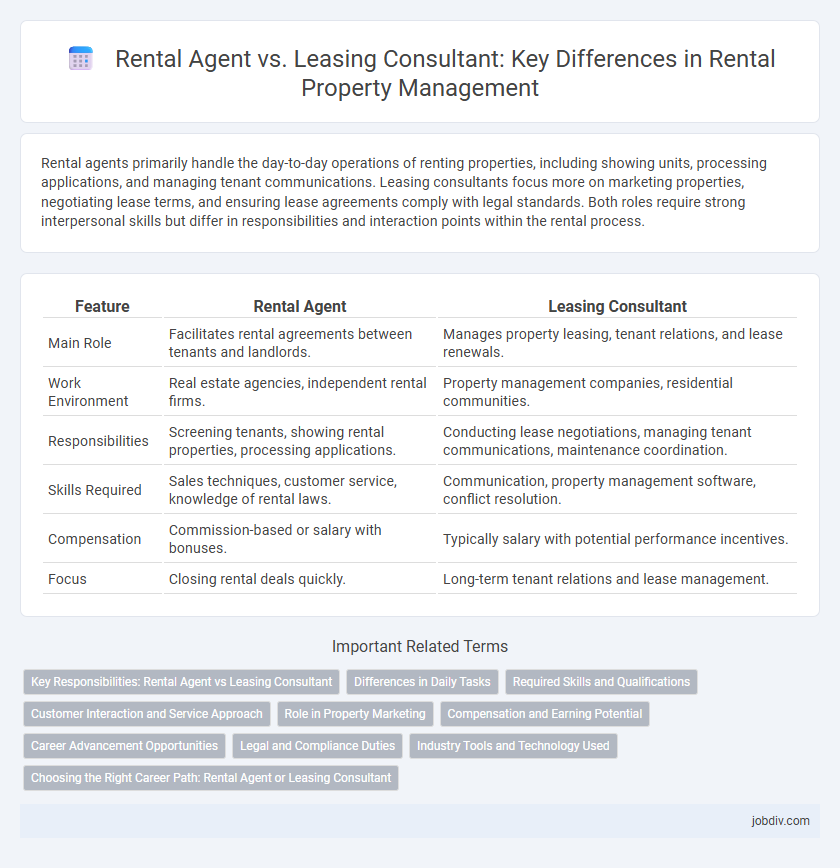Rental agents primarily handle the day-to-day operations of renting properties, including showing units, processing applications, and managing tenant communications. Leasing consultants focus more on marketing properties, negotiating lease terms, and ensuring lease agreements comply with legal standards. Both roles require strong interpersonal skills but differ in responsibilities and interaction points within the rental process.
Table of Comparison
| Feature | Rental Agent | Leasing Consultant |
|---|---|---|
| Main Role | Facilitates rental agreements between tenants and landlords. | Manages property leasing, tenant relations, and lease renewals. |
| Work Environment | Real estate agencies, independent rental firms. | Property management companies, residential communities. |
| Responsibilities | Screening tenants, showing rental properties, processing applications. | Conducting lease negotiations, managing tenant communications, maintenance coordination. |
| Skills Required | Sales techniques, customer service, knowledge of rental laws. | Communication, property management software, conflict resolution. |
| Compensation | Commission-based or salary with bonuses. | Typically salary with potential performance incentives. |
| Focus | Closing rental deals quickly. | Long-term tenant relations and lease management. |
Key Responsibilities: Rental Agent vs Leasing Consultant
Rental agents primarily handle property showings, tenant screening, and lease agreement preparation, ensuring prospective renters meet qualifications and properties are presented effectively. Leasing consultants focus on marketing rental units, managing lease negotiations, and maintaining tenant relations to promote long-term occupancy and customer satisfaction. Both roles require knowledge of rental laws, but rental agents emphasize client acquisition while leasing consultants prioritize lease administration and tenant retention.
Differences in Daily Tasks
Rental agents primarily handle property showings, tenant screenings, and lease signings, ensuring clients find suitable rental accommodations. Leasing consultants focus more on marketing rental properties, managing lease renewals, and maintaining tenant relationships to promote long-term occupancy. Both roles require strong communication skills but differ in emphasis on sales versus tenant retention activities.
Required Skills and Qualifications
Rental agents typically require strong customer service skills, knowledge of local rental markets, and proficiency in handling tenant inquiries and lease agreements. Leasing consultants need expertise in property management software, negotiation abilities, and a solid understanding of fair housing laws and rental regulations. Both roles benefit from excellent communication skills, attention to detail, and experience in sales or real estate.
Customer Interaction and Service Approach
Rental agents prioritize efficient customer interaction by addressing immediate inquiries and processing applications quickly, ensuring swift lease agreements. Leasing consultants engage in a more consultative service approach, guiding prospective tenants through property features and lease terms to match their needs. Both roles enhance tenant satisfaction but differ in focus: rental agents emphasize transaction speed, while leasing consultants focus on personalized service.
Role in Property Marketing
Rental agents primarily focus on showcasing available properties to prospective tenants and managing inquiries, often handling multiple listings to maximize occupancy rates. Leasing consultants emphasize building relationships with potential renters through personalized tours and thorough explanations of lease terms, boosting tenant retention and satisfaction. Both roles contribute strategically to property marketing by attracting qualified tenants and facilitating smooth leasing processes.
Compensation and Earning Potential
Rental agents typically earn commissions based on the number of leases they close, with average annual earnings ranging from $30,000 to $50,000 depending on the market and property size. Leasing consultants often receive a combination of a base salary and performance bonuses, resulting in a more stable income that can range from $35,000 to $60,000 annually. Both roles have earning potential influenced by location, experience, and the volume of rental transactions handled.
Career Advancement Opportunities
Rental agents typically handle day-to-day tenant interactions, gaining valuable customer service and property management experience that forms a foundation for career growth. Leasing consultants often take on more strategic responsibilities, such as marketing properties and negotiating lease terms, which prepares them for higher roles like property manager or real estate sales. Advancing from rental agent to leasing consultant enhances skills in client relations and market analysis, opening pathways to leadership positions within the real estate and property management sectors.
Legal and Compliance Duties
Rental agents and leasing consultants both handle tenant interactions but differ significantly in legal and compliance responsibilities. Rental agents primarily facilitate property showings and rental applications, ensuring adherence to fair housing laws and disclosure requirements. Leasing consultants typically manage lease agreements, enforce lease terms, and oversee compliance with state and federal rental regulations, including eviction procedures and rent control laws.
Industry Tools and Technology Used
Rental agents typically utilize customer relationship management (CRM) software and online listing platforms like Zillow and Apartments.com to streamline tenant screening and property showings. Leasing consultants often rely on property management systems (PMS) such as Yardi and Entrata for lease tracking, maintenance requests, and digital tenant applications. Both roles integrate virtual tour technology and electronic signature tools to enhance efficiency and improve tenant experience.
Choosing the Right Career Path: Rental Agent or Leasing Consultant
Choosing between a rental agent and a leasing consultant depends on career goals and preferred responsibilities; rental agents focus on short-term property rentals and customer service, while leasing consultants typically handle long-term leases with an emphasis on property management and tenant relations. Rental agents often work in more transactional environments, ideal for those seeking quick client turnover and sales skills development. Leasing consultants benefit from roles offering deeper involvement in property marketing, lease negotiations, and maintaining tenant satisfaction, appealing to candidates interested in long-term residential or commercial property management.
Rental Agent vs Leasing Consultant Infographic

 jobdiv.com
jobdiv.com